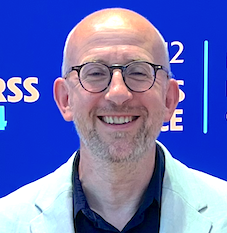Keynote Lecture: Pulse Position Modulation (PPM) for Energy-Efficient Optical Communication Over Large Distances by Prof. Dr. Artūrs Āboltiņš
IEEE MTTW'24
In this presentation, we will discuss the design of the signalling waveform and the impact of the PPM waveform parameters on the energy efficiency and bit rate of the communication link. International standards which regulate signalling protocols will be reviewed in the second part. In the third part of the presentation, we will pay attention to the ongoing industrial and academic activities in Latvia and abroad related to implementing efficient PPM communication systems in terrestrial and space applications.
Date and Time
Location
Hosts
Registration
-
 Add Event to Calendar
Add Event to Calendar
- Contact Event Hosts
-
Chair: Anna Litviņenko
Technical co-chair: Andrejs Romanovs and Nadezda Kunicina
Speakers
Prof. Dr. Artūrs Āboltiņš of Riga Technical University
Pulse Position Modulation (PPM) for Energy-Efficient Optical Communication Over Large Distances
Abstract: Deep space communication is poised to be a key enabler of future space exploration, and the interplay between government initiatives and private ventures will likely shape its evolution over the coming decades. Demand for high-speed connections is related to the need to send large amounts of measurements from imaging and other sensors. Radio communications can provide very limited data transfer rates over distances of more than 100 000 km. Therefore, future missions to the Moon (384400 km), Mars (54.6 million km), and Jupiter (588 million km) require switching to free space optical communications (FSO) and advanced signalling techniques, such as pulse position modulation (PPM). These techniques, in conjunction with sophisticated signal processing and coding techniques, allow for significantly increased communication distance and save the power budget of the spacecraft.
In this presentation, we will discuss the design of the signalling waveform and the impact of the PPM waveform parameters on the energy efficiency and bitrate of the communication link. International standards which regulate signalling protocols will be reviewed in the second part. In the third part of the presentation, we will pay attention to the ongoing industrial and academic activities in Latvia and abroad related to implementing efficient PPM communication systems in terrestrial and space applications.
Biography:
Arturs Aboltins is a seasoned researcher and professor with extensive experience in telecommunications and software development. Since 2008, he has been a Senior Researcher and Professor at Riga Technical University (RTU), where he lectures on signal theory and software-defined radio while conducting scientific research in wireless communication, ultra-wideband technology, and radar/lidar systems. Since 2022, he has been with Eventech LTD, consulting on implementing PPM-based communication systems for space applications. Arturs has a solid background in telecommunications, electronics, and software development and has worked as an engineer for telecom companies. His technical expertise includes programming languages like Python, MATLAB, C/C++, and JavaScript. He holds a PhD in Circuits and Systems from RTU and is a prolific author with over 50 scientific publications in international conferences and journals. Additionally, he has been actively involved in IEEE as the chair of the Latvia Section for Communication, Microwave, and Antenna Propagation from 2018 to 2022. His career combines academic leadership, technical innovation, and significant contributions to telecommunications research.
Address:Riga Technical University, , Riga, Latvia, LV-1048
Agenda
| 09:00–13:30 | 2024 IEEE 65th International Scientific Conference on Information Technology and Management Science of Riga Technical University (ITMS'2024) | ||||||||||||||||
| 13:30–14:00 | Coffee Break & MTTW Registration | ||||||||||||||||
| 14:00–14:15 | MTTW Opening Ceremony Prof. Dr. Anna Litviņenko, Dr. Andrejs Romānovs, Prof. Dr. Nadežda Kuņicina |
||||||||||||||||
| 14:15–15:00 | Keynote Lecture Pulse Position Modulation (PPM) for Energy-Efficient Optical Communication Over Large Distances by Prof. Dr. Artūrs Āboltiņš | ||||||||||||||||
| 15:00–15:45 | Keynote Lecture A Fast Ray-Tracing Code for the Simulation of Lens Antennas by Prof. Dr. Oscar Quevedo-Teruel | ||||||||||||||||
| 15:45–17:45 | Session A1: Microwave Technology and Wireless Communications In-Person Chairs: Dr. Deniss Kolosovs, Prof. Dr. Oscar Quevedo-Teruel
|
||||||||||||||||
| 17:45–18:00 | Closing and Awards Ceremony |
IEEE MTTW'24


